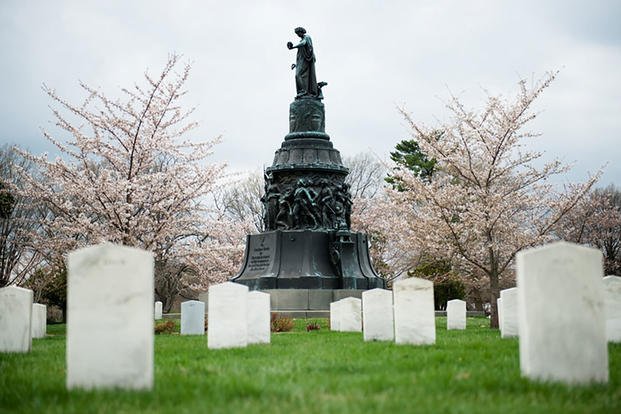
Chris Lange, FISM News
[elfsight_social_share_buttons id=”1″]
An independent commission is recommending that the Confederate Memorial at Arlington National Cemetery be dismantled and removed from the cemetery.
The recommendation was made as part of the Naming Commission’s final report to Congress on the renaming of U.S. military bases and assets that memorialize the Confederacy.
The Naming Commission, which is made up of former U.S. military members and other officials, said the 32-foot-tall bronze statue of a woman representing the South, is “problematic from top to bottom” and should be removed entirely. Unveiled in 1914, the statue’s base also features shields bearing the coats of arms of the 13 Confederate states and engravings of Confederate soldiers going off to war. The base also includes “highly sanitized depictions of slavery,” according to the Arlington National Cemetery’s website.
The panel also submitted its final list of 1,100 Confederate-linked Defense Department assets, including ships, buildings, base roads, and other items they say should be renamed, an undertaking the commission estimates will cost over $60 million.
The Naming Commission was created by Congress in 2021 in the aftermath of the death of George Floyd. Its mission is “providing naming, renaming, and removal recommendations to Congress for all Department of Defense items that commemorate the Confederate States of America or any person who served voluntarily with the Confederate States of America,” the panel’s website says.
Numerous military officials have defended monuments and other displays commemorating the Confederacy, saying that they preserve important historical events in American history, as opposed to showing support for them.
The panel released sweeping recommendations in May, proposing new names, many honoring minorities and women, for nine U.S. Army bases that commemorated Confederate officers: Fort Bragg in North Carolina, Fort Benning and Fort Gordon in Georgia, Fort A.P. Hill, Fort Lee, and Fort Pickett in Virginia, Fort Hood in Texas, Fort Polk in Louisiana, and Fort Rucker in Alabama.
Rep. Adam Smith (D-Wash.), chairman of the House Armed Services Committee, hailed the list as a “significant milestone” and a “first step in addressing Confederate symbolism in the U.S. military.”
Retired Lt. Gen. Thomas Bostick, also a member of the commission, said the group spoke with lawmakers on Tuesday and stressed the importance of working with local communities to address Confederate-linked names of nonmilitary assets like city streets, according to a Stars and Stripes report.
“I think the [military] bases are going to have to work with the communities together and that’s why it was important, we believe, to have the communities involved, to hear their concerns and that they’ll work this together,” he said about choosing new names for the nine Army bases.
“I don’t think you’ll see it change overnight, but we’ve got a deadline of Jan. 1, 2024, so I’m sure they’ll set a plan and work towards it as quickly as they can,” Bostick added.
The commission recommended that bases work with local historical societies, museums, and veteran associations to donate Defense Department assets that will be removed as part of the renaming process to those interested entities.
Ahead of the final report submission, panel member Ty Seidule, a Professor of History at Hamilton College and Professor Emeritus at West Point, tweeted “Proud of our work on the #namingcommission! Commemoration is about our values. West Point cadets will still study Civil War history but they will live in barracks named for true American heroes.”
This article was partially informed by reports by ABC News, The Washington Post, and the Washington Times.
